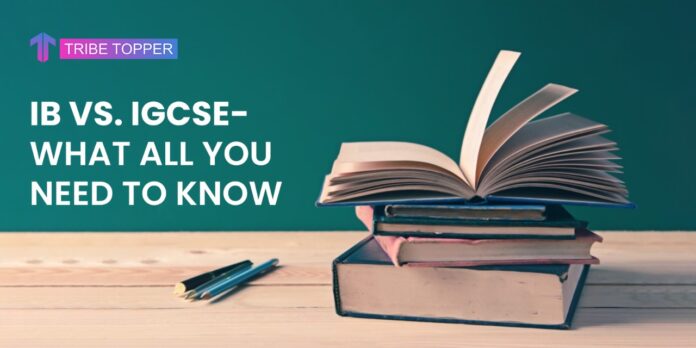IB vs. IGCSE
IB and IGCSE both are international recognized programs. These two programs are the best opportunity for all the Students who wanted to peruse their further education at international Universities like Harvard University, University of Oxford, Florida University, etc. Let’s look into the details of both international boards so that you will be able to find a suitable one for yourself.
IB – International Baccalaureate Moreover it emphasizes both critical thinking and creativity. It offers four educational programs for children aged 3-19.
- Programs offered by IB are:
- Primary year program (PYP): for students aged 3-11.
- Middle-year program (MYP): for Students aged 11-16.
- IB diploma program (IBDP): for Students aged 16-19.
- Career-related program (CP): for Students aged 16-19.
- IB world schools in India: There are 205 IB world schools in India of which 154 schools offer IB diploma programs. These schools are majorly located in mega-cities like Delhi, Mumbai, Kolkata, Bangalore, Chennai, etc.
IB schools like the Scottish high international school of Guru gram provide both PYP and IBDP programs as well as American School of Bombay and Greenwood high school of Bangalore are other famous IB schools that provide these programs.
The Grading system of IB:
The Grading system of IBDP works on the philosophy of the IB framework. Along with three DP cores, it is a must for you to do 6 subjects. They provide six subject groups from which you can choose one subject from each.
Six groups of subjects are:
- Studies in language and literature
- Language acquisition
- Individuals and societies
- Sciences
- Mathematics
- The arts
DP core includes the theory of knowledge, extended essay, and creativity activity service.
Students are graded on a scale of 45 points in which every subject carries 7 points and DP core have 3 points. To get the diploma, you should have a minimum of 24 points or 4 points in each subject.
Why you should choose IB?
IB is a whole framework of group certification where you do a bit of every subject. And can also do a deep study of your core subjects. It offers you programs in three languages that are English, Spanish, and French. PYP is a well-structured program for children where they get to know about every subject. PYP promotes creativity as well as conceptual study.
IB diploma is now recognized by all the universities and colleges across the world.
IGCSE (International general certificate of secondary education)
It is also a non-profit educational foundation taken under the Cambridge International Examinations (CIE). It is founded more than 30 years ago and now its programs are being taught by more than 4500 schools across 140 countries all over the world. IGCSE is famous as a school curriculum system however it is equivalent to the GCSE qualification of the British. CIE offers three educational programs for children aged 3-16.
The Program offered by CIE:
- Primary for 5-11 years old
- Secondary for 11-14 years old
- Secondary 2 for 14-16 years old
IGSCE schools in India:
There are around 569 schools in India that offers Cambridge programs and qualifications in India. IGSCE board schools have a wide range across India. Top IGSCE schools include The British school of Delhi, The Singapore international school of Mumbai, The Trivandrum international school of Kerala, The Raffles international school of Rajasthan, and so on. These schools provide the best infrastructure and community for students.
Why you should choose IGSCE?
Why IGSCE is the best choice for you to choose because it is a student-centric curriculum that promotes inquiry-based learning. This learning will improve your critical thinking and problem-solving skills. Moreover, the IGCSE curriculum is recognized in all colleges and universities in the world.
It offers two levels of learning: ‘O’ and ‘A’
‘O’ means ‘ordinary’ in which you can learn the basics of the subjects you choose.
‘A’ means ‘advance’ in which you can master that particular subject.
You are offered more than 70 various courses in IGSCE like English, Hindi (as a second language), physics, business studies, global perspective, Economics, environmental management, etc.
IGCSE has a simple grading system – You will be graded on a scale of ‘A’ to ‘G’.
Progressive Board
The best part of the IGSCE board is that it has changed its education cycle according to a particular country, Specifically India. IGCSE generally conducted its exams in October and November. But after recognizing the Indian exam cycle and the difficulties faced by students while admitted to colleges or universities to IGSCE they started conducting their exams in Feb and March. This is something in which IGSCE is leading to IB. Now, you can give your IGSCE exams in March and can get admission to any Indian University without wasting a year.
Tribe Topper website offers supplemental revision courses for both and Cambridge International boards, IBDP, IBMYP and CIE A levels and IGCSE. Their courses in Sciences and Math will help you score higher and ace exams. You can find past paper solutions, questions banks and key concepts.
Both the IB and IGSCE are international boards that focus on the skills that the real world requires. One of IB’s drawbacks is that it’s not flexible as IGSCE and MYP do not provide a specific certificate. But IB‘s primary year program is a well-structured course. You can pick the best from both boards as most of the international schools are doing right now. They are providing IB primary year program then IGSCE as secondary education and then the IB diploma course for 11 and 12 grades. In my opinion, you can mix and match these two boards and get the best out of both.
Apart from this, if you want to know about Tanzania’s Zanzibar: A Treasure Trove of Beaches and Culture then please visit our Education category











